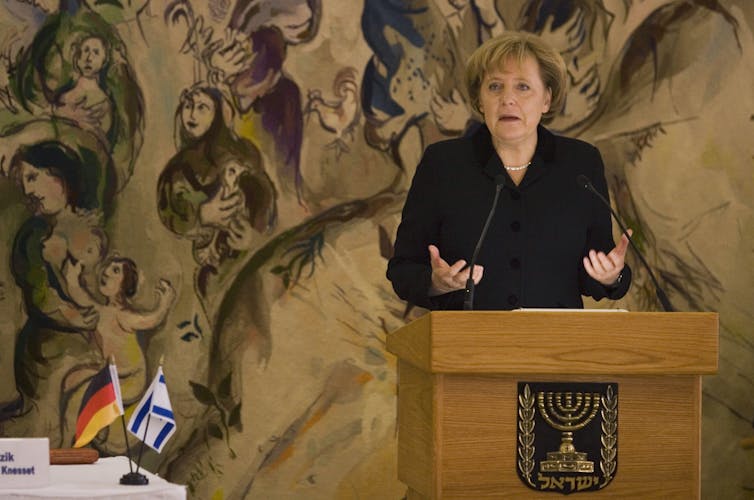German chancellor’s rebuke of Israel marks a shift in state policy that has long put such criticism
Germany’s ‘Staatsräson’ has long held Israel’s security as its ‘reason of state.’

Friedrich Merz did something unprecedented for a German chancellor in late May 2025: publicly criticize Israel in unvarnished, unequivocal terms.
“What the Israeli army is doing in the Gaza Strip, I no longer understand the goal,” he said in a televised interview. He added, “To harm the civilian population in such a way … can no longer be justified as a fight against terrorism.”
A day later, during a summit with prime ministers of Nordic countries in Finland, Merz doubled down. “I take a very, very critical view of what has happened in Gaza,” he said in reference to Israel’s bombing campaign and the blockade of food and other aid.
Merz is not alone in the German government. Foreign Minister Johann Wadephul also weighed in, noting that Germany’s stance against antisemitism and its “full support” for the right of Israel to exist “must not be instrumentalized for the conflict and the warfare currently being waged in the Gaza Strip.”
Criticism by outside governments of Israel’s response to the Oct. 7, 2023, attacks by Hamas that killed close to 1,200 people has been present since the war in Gaza began. At first, it was largely confined to countries in the Global South. But more recently it has included countries in the West.
Still, as a scholar of the Shoah – the Hebrew term for the Holocaust – I know that this rebuke from Germany hits differently. Post-war Germany has a long-standing political commitment to Israel’s security. It is a commitment rooted in the nation’s historical responsibility for the Nazis’ annihilation of European Jews and that has been staunchly reaffirmed by German governments since the 1952 agreement of reparations between the first chancellor of the Federal Republic of Germany, Konrad Adenauer, and the first prime minister of Israel, David Ben-Gurion.
‘Staatsräson’ and its critics
In 2008, then-chancellor Angela Merkel went so far as to call this commitment to Israel’s security Germany’s “Staatsräson,” or “reason of state.” In a speech she gave to the Israeli parliament, the Knesset, on March 18, 2008, Merkel emphasized that “only if Germany acknowledges its perpetual responsibility for the moral catastrophe of German history can we shape the future humanely.” She went on to assert that Germany’s “historic responsibility” is “part of my country’s raison d’état.” She added: “Israel’s security is never negotiable for me as German chancellor.”
The argument that Israeli security is Germany’s “reason of state” was reiterated by Merkel’s successor, Olaf Scholz, during his visit to Israel on Oct. 17, 2023 – just 10 days after the Hamas attack. Standing next to Scholz, the Israeli Prime Minister Benjamin Netanyahu called the Palestinian militant group “the new Nazis.”
Tracing back the term’s origins and history, renowned historian Enzo Traverso recently noted that theorists and practitioners of “reason of state” agree that the concept “denotes the violation by a political power of its own ethical principles in service to a higher interest, generally the safeguarding of its own power.”
The problem with Germany’s invocation of the “Staatsräson” as prioritizing the security of Israel above other concerns is that it implies defending policies even if they contravene Germany’s foundational ethical principles, such as those declared in its constitution. Article 1 asserts that the German people “acknowledge inviolable and inalienable human rights as the basis of every community, of peace and of justice in the world.”
Such principles were born out of the recognition of the horrendous violation of human rights under the Nazi regime and the acknowledgment of Germany’s “perpetual responsibility,” as Merkel put it.

In Germany’s public discourse, as well as school curricula, the Shoah is always described as absolutely unique.
But as Israeli-American genocide and Holocaust scholar Omer Bartov has argued, this assertion is also open to criticism:
“Germany’s commitment to the uniqueness of the Holocaust, from which it also derives its unique commitment to Israel, has arguably put it in a morally highly dubious position of both long denying its own past colonial crimes [in Namibia] and of denying Israel’s culpability in the present destruction of Gaza, including the killing and starvation of tens of thousands of Palestinian civilians.”
Germany’s commitment to the uniqueness of the Shoah also leaves little room for an acknowledgment of the Nakba – the violent expulsion of around 800,000 Palestinians before, during and after the foundation of the state of Israel.
And it leaves no room for a recognition of how both catastrophes, the Shoah and the Nakba, are, as Bartov insists, “inextricably entangled.”
Antisemitism definitions — and their critics
As a consequence of Germany’s responsibility for the Shoah and its commitment to its uniqueness, the country has some of the strictest laws to combat antisemitism in the world. But critics also note widespread conflation of antisemitism with criticism of Israel.
Germany, like the United States, has adopted a definition of antisemitism authored in 2004 by American lawyer Kenneth Stern and espoused in 2016 by the International Holocaust Remembrance Alliance. That definition includes 11 examples of antisemitism, seven of which pertain to Israel.
It has been criticized for being too vague, leading to the labeling of Jewish and non-Jewish people who oppose the current Israeli war in Gaza as “antisemitic.”
Stern, who describes himself as Zionist, has sharply criticized the misuse of his definition to stifle academic freedom and criticism of the actions of the Israeli nation.
In an article for the conservative Germany newspaper Frankfurter Allgemeine Zeitung, Israeli legal scholar Itamar Mann argued that Germany “needs a new definition of antisemitism.”
He applauded the recent adoption, by the German leftist party Die Linke, of a separate definition of antisemitism laid out in the Jerusalem Declaration on Antisemitism. Formulated in 2021 by more than 350 respected scholars, many of them Jewish, the declaration rejects labeling as antisemitic political speech that “criticizes or opposes Zionism as a form of nationalism.”
Mann calls on the German government to implement policies to “protect all Jews, including those who … reject the current Israeli government and insist on a vocabulary that allows us to be Jewish and to criticize Israel.”
A historic shift?
The recent remarks of Merz may represent a subtle but sure shift in Germany’s “Staatsräson” and how it engages with its historical debt, Israel and antisemitism.
And that may be a first step in moving away from a “Staatsräson” that, in the words of scholar of Middle Eastern politics Lena Obermaier, is “detrimental for Palestinians and progressive Jews” and gives Israel international cover when accused of massive violations of international law.
What Merkel called Germany’s “perpetual responsibility for the moral catastrophe” of the Holocaust would, from my perspective as a scholar of the Shoah, demand nothing less.
Elisabeth Weber does not work for, consult, own shares in or receive funding from any company or organization that would benefit from this article, and has disclosed no relevant affiliations beyond their academic appointment.
Read These Next
Supreme Court rules against Trump’s emergency tariffs – but leaves key questions unanswered
The ruling strikes down most of the Trump administration’s current tariffs, with more limited options…
After a 32-hour shift in Pittsburgh, I realized EMTs should be napping on the job
A paramedic and university professor shares data about how strategic napping could help his own health…
How Dracula became a red-hot lover
Count Dracula was originally a rank-breathed predator. His transformation into a tragic romantic mirrors…






